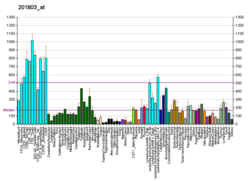DNA-directed RNA polymerase II subunit RPB2 is an enzyme that in humans is encoded by the POLR2B gene.
This gene encodes the second largest subunit of RNA polymerase II, the polymerase responsible for synthesizing messenger RNA in eukaryotes. This subunit, in combination with at least two other polymerase subunits, forms a structure within the polymerase that maintains contact in the active site of the enzyme between the DNA template and the newly synthesized RNA.
Interactions
POLR2B has been shown to interact with POLR2C, POLR2E, POLR2H and POLR2L.
References
- ^ GRCh38: Ensembl release 89: ENSG00000047315 – Ensembl, May 2017
- ^ GRCm38: Ensembl release 89: ENSMUSG00000029250 – Ensembl, May 2017
- "Human PubMed Reference:". National Center for Biotechnology Information, U.S. National Library of Medicine.
- "Mouse PubMed Reference:". National Center for Biotechnology Information, U.S. National Library of Medicine.
- Acker J, Wintzerith M, Vigneron M, et al. (October 1992). "Primary structure of the second largest subunit of human RNA polymerase II (or B)". J Mol Biol. 226 (4): 1295–9. doi:10.1016/0022-2836(92)91071-V. PMID 1518060.
- Acker J, Mattei MG, Wintzerith M, et al. (August 1994). "Chromosomal localization of human RNA polymerase II subunit genes". Genomics. 20 (3): 496–9. doi:10.1006/geno.1994.1208. PMID 8034326.
- "Entrez Gene: POLR2B polymerase (RNA) II (DNA directed) polypeptide B, 140kDa".
- ^ Acker J, de Graaff M, Cheynel I, et al. (July 1997). "Interactions between the human RNA polymerase II subunits". J. Biol. Chem. 272 (27). UNITED STATES: 16815–21. doi:10.1074/jbc.272.27.16815. ISSN 0021-9258. PMID 9201987.
Further reading
- Jeang KT (1998). "Tat, Tat-associated kinase, and transcription". J. Biomed. Sci. 5 (1): 24–7. doi:10.1007/BF02253352. PMID 9570510.
- Yankulov K, Bentley D (1998). "Transcriptional control: Tat cofactors and transcriptional elongation". Curr. Biol. 8 (13): R447–9. Bibcode:1998CBio....8.R447Y. doi:10.1016/S0960-9822(98)70289-1. PMID 9651670. S2CID 15480646.
- Romano G, Kasten M, De Falco G, et al. (2000). "Regulatory functions of Cdk9 and of cyclin T1 in HIV tat transactivation pathway gene expression". J. Cell. Biochem. 75 (3): 357–68. doi:10.1002/(SICI)1097-4644(19991201)75:3<357::AID-JCB1>3.0.CO;2-K. PMID 10536359. S2CID 43685090.
- Marcello A, Zoppé M, Giacca M (2002). "Multiple modes of transcriptional regulation by the HIV-1 Tat transactivator". IUBMB Life. 51 (3): 175–81. doi:10.1080/152165401753544241. PMID 11547919. S2CID 10931640.
- Stevens M, De Clercq E, Balzarini J (2007). "The regulation of HIV-1 transcription: molecular targets for chemotherapeutic intervention". Med Res Rev. 26 (5): 595–625. doi:10.1002/med.20081. PMC 7168390. PMID 16838299.
- Harrich D, McMillan N, Munoz L, et al. (2007). "Will diverse Tat interactions lead to novel antiretroviral drug targets?". Current Drug Targets. 7 (12): 1595–606. doi:10.2174/138945006779025338. PMID 17168834.
- Kato H, Sumimoto H, Pognonec P, et al. (1992). "HIV-1 Tat acts as a processivity factor in vitro in conjunction with cellular elongation factors". Genes Dev. 6 (4): 655–66. doi:10.1101/gad.6.4.655. PMID 1559613.
- Southgate C, Zapp ML, Green MR (1990). "Activation of transcription by HIV-1 Tat protein tethered to nascent RNA through another protein". Nature. 345 (6276): 640–2. Bibcode:1990Natur.345..640S. doi:10.1038/345640a0. PMID 2190099. S2CID 4233742.
- Zheng XM, Black D, Chambon P, et al. (1990). "Sequencing and expression of complementary DNA for the general transcription factor BTF3". Nature. 344 (6266): 556–9. Bibcode:1990Natur.344..556Z. doi:10.1038/344556a0. PMID 2320128. S2CID 4227320.
- Wu-Baer F, Sigman D, Gaynor RB (1995). "Specific binding of RNA polymerase II to the human immunodeficiency virus trans-activating region RNA is regulated by cellular cofactors and Tat". Proc. Natl. Acad. Sci. U.S.A. 92 (16): 7153–7. Bibcode:1995PNAS...92.7153W. doi:10.1073/pnas.92.16.7153. PMC 41297. PMID 7638159.
- Herrmann CH, Rice AP (1995). "Lentivirus Tat proteins specifically associate with a cellular protein kinase, TAK, that hyperphosphorylates the carboxyl-terminal domain of the large subunit of RNA polymerase II: candidate for a Tat cofactor". J. Virol. 69 (3): 1612–20. doi:10.1128/JVI.69.3.1612-1620.1995. PMC 188757. PMID 7853496.
- Andersson B, Wentland MA, Ricafrente JY, et al. (1996). "A "double adaptor" method for improved shotgun library construction". Anal. Biochem. 236 (1): 107–13. doi:10.1006/abio.1996.0138. PMID 8619474.
- Keen NJ, Gait MJ, Karn J (1996). "Human immunodeficiency virus type-1 Tat is an integral component of the activated transcription-elongation complex". Proc. Natl. Acad. Sci. U.S.A. 93 (6): 2505–10. Bibcode:1996PNAS...93.2505K. doi:10.1073/pnas.93.6.2505. PMC 39827. PMID 8637904.
- Yang X, Herrmann CH, Rice AP (1996). "The human immunodeficiency virus Tat proteins specifically associate with TAK in vivo and require the carboxyl-terminal domain of RNA polymerase II for function". J. Virol. 70 (7): 4576–84. doi:10.1128/JVI.70.7.4576-4584.1996. PMC 190394. PMID 8676484.
- Agostini I, Navarro JM, Rey F, et al. (1996). "The human immunodeficiency virus type 1 Vpr transactivator: cooperation with promoter-bound activator domains and binding to TFIIB". J. Mol. Biol. 261 (5): 599–606. doi:10.1006/jmbi.1996.0485. PMID 8800208.
- Zhou Q, Sharp PA (1996). "Tat-SF1: cofactor for stimulation of transcriptional elongation by HIV-1 Tat". Science. 274 (5287): 605–10. Bibcode:1996Sci...274..605Z. doi:10.1126/science.274.5287.605. PMID 8849451. S2CID 13266489.
- Okamoto H, Sheline CT, Corden JL, et al. (1996). "Trans-activation by human immunodeficiency virus Tat protein requires the C-terminal domain of RNA polymerase II". Proc. Natl. Acad. Sci. U.S.A. 93 (21): 11575–9. Bibcode:1996PNAS...9311575O. doi:10.1073/pnas.93.21.11575. PMC 38099. PMID 8876177.
- Chun RF, Jeang KT (1996). "Requirements for RNA polymerase II carboxyl-terminal domain for activated transcription of human retroviruses human T-cell lymphotropic virus I and HIV-1". J. Biol. Chem. 271 (44): 27888–94. doi:10.1074/jbc.271.44.27888. PMID 8910388.
This article on a gene on human chromosome 4 is a stub. You can help Misplaced Pages by expanding it. |




